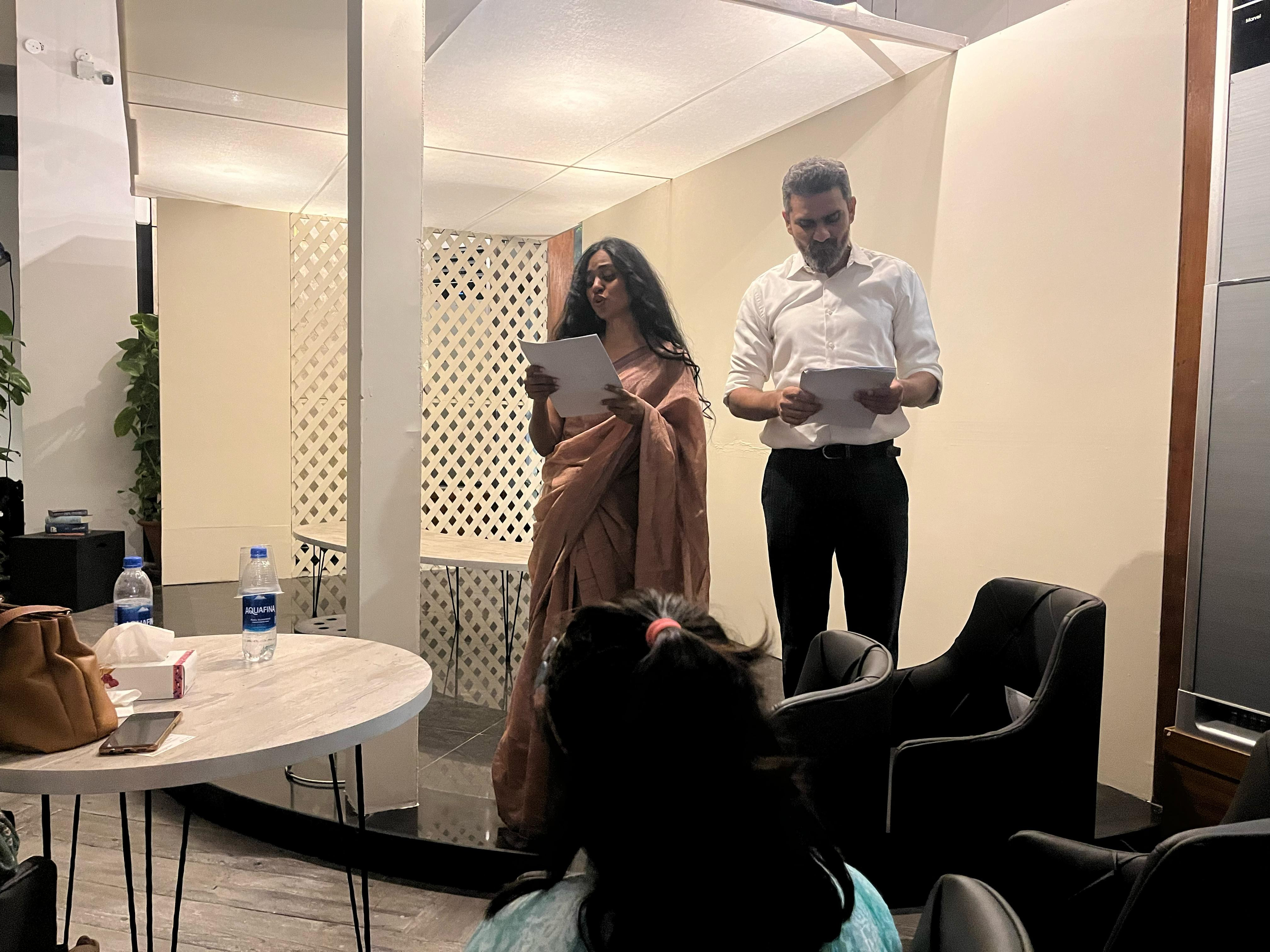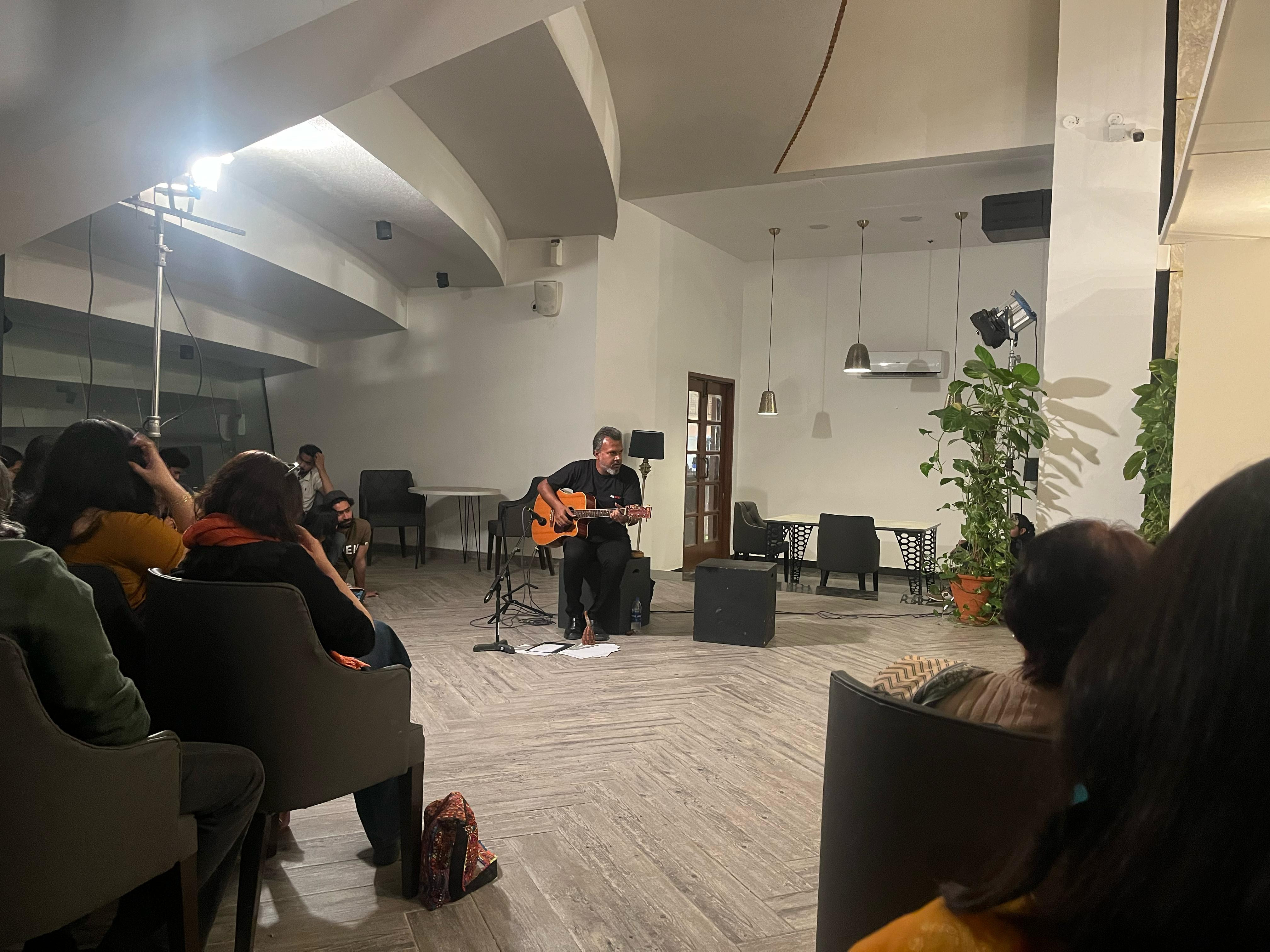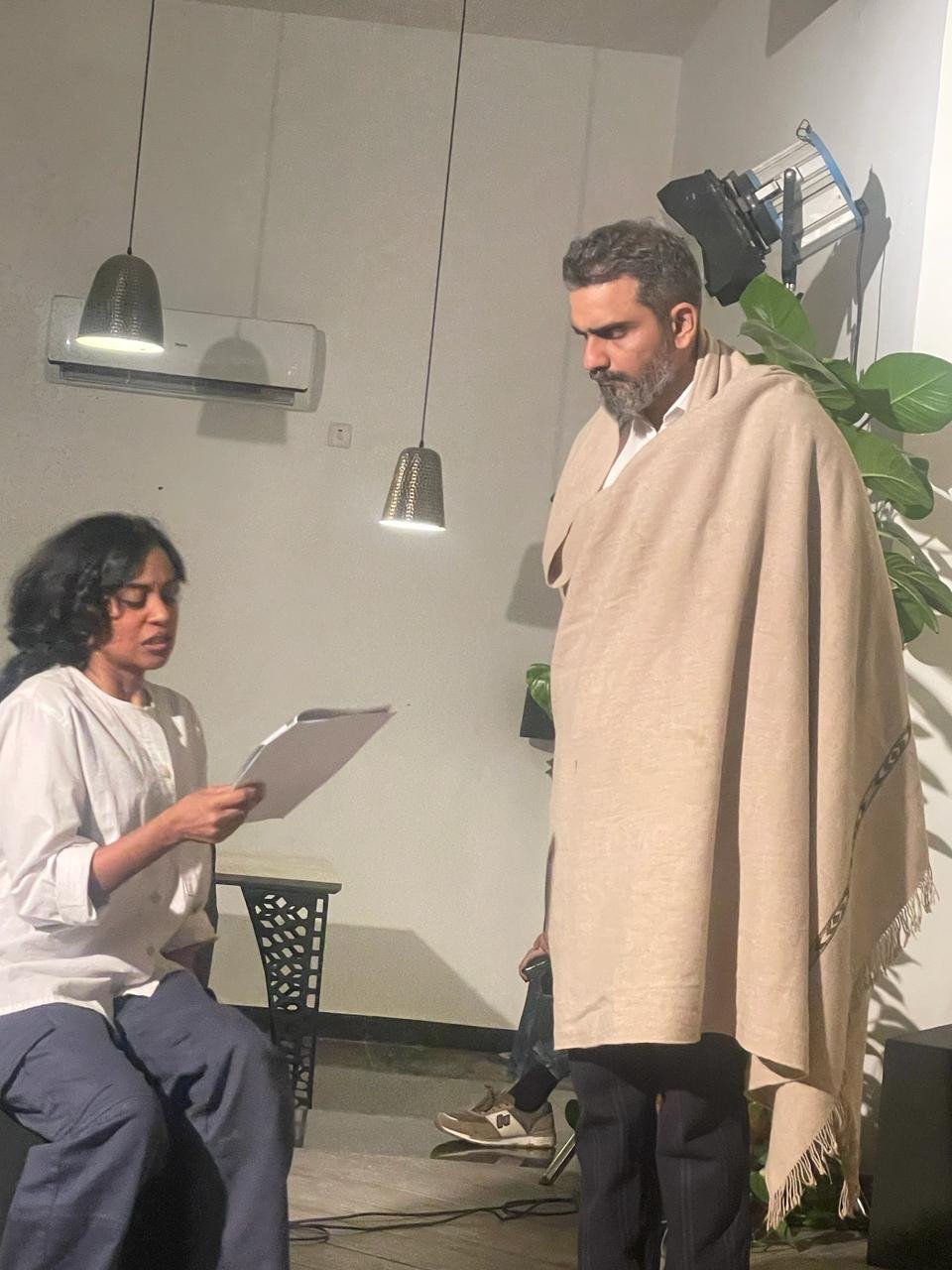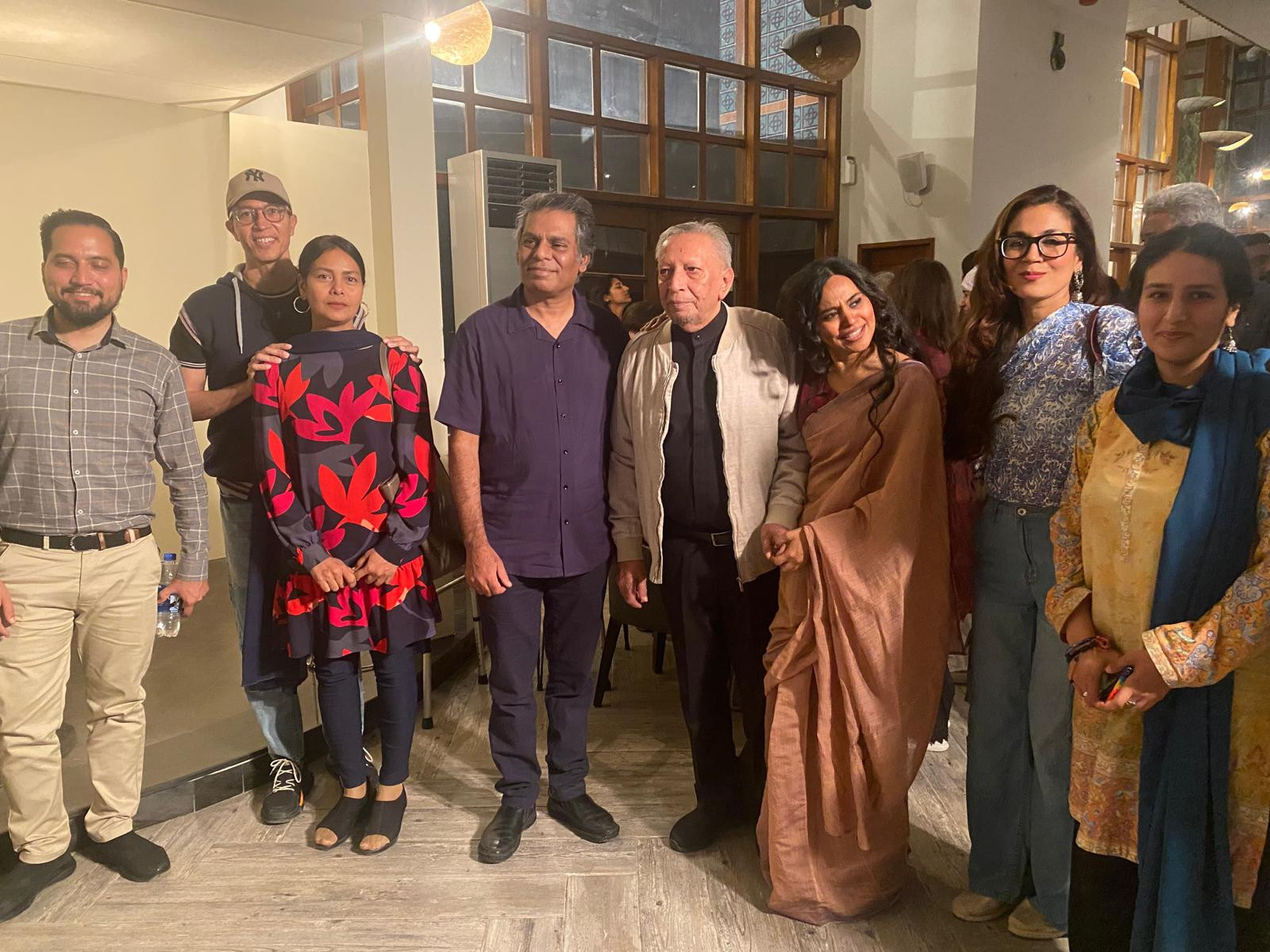Think of Talat Hussain and you come across most of the TV classics we have grown up on; he was the protagonist in Haseena Moin’s Bandish, one of the three suitors in Parchaiyan, the evil Aalijah in Kashkol, the mercurial lawyer in Rozan e Zindan, and the drug lord in British TV series Traffik. Some might even pride themselves in knowing about his one-film Bollywood career and his winning the Scandinavian Academy Award for Norwegian film Import-Export but not much was known about him as an author.
His students Kulsoom Aftab and Fawad Khan (of Nayab fame) ensured that through Sandooq, people got to know of their mentor’s hidden talents while he was still around. The veteran actor is currently suffering from a form of dementia and hardly recognises anyone due to it, yet he was present at the event last month to cheer for his pupils who organized the dramatic reading session.
Under the banner of Theatre K Productions, the dramatic reading session featured three short stories written by Talat Hussain – Sandooq, Pheekay Neelay Rung Ka Aasmaan, and Taza Bastiya’an. All three ‘theatrical responses to literature’ were directed by Kulsoom Aftab who is herself a theatre veteran, and Fawad Khan who along with the director was able to bring Talat Hussain’s creations to life, live!
The first story Sandooq was about a young boy whose parents had migrated from India to Pakistan during Partition, and who were living comfortably until one day, the father decided to clean one of the ‘sandooqs’ they had with the help of the son. Not only was the son anxious to find out what was inside the coffer but he was also hoping to find out some of his lost toys during the process.

The second and third short stories also had their plots revolving around human nature, but it was the way that they were presented to the audience that made them stand out. Both Kulsoom Aftab and Fawad Khan were exceptional while reading the stories and their delivery transported the audience into the make-believe world they were talking about, taking them away momentarily.
It wouldn’t be incorrect to say that while Kulsoom recreated the blurred lines between memory, dreams, and imaginings, Fawad Khan embodied the magic of storytelling, and together they made their teacher proud, who was smiling all the time while sitting in the first row. Zeeshan Pervaiz’s compositions also added colour to the evocative words delivered by the artists, making it a memorable night for all in attendance.
What struck out as odd in a good way was how the stories were penned — they were not the usual good defeat evil kind of stories but made the audience think. The collective effort resulted in the rare form of dramatic readings where literature and performing arts come together to create magic.
One must mention the creative use of the space where the reading took place, and where the attendees sat for the entire show. The place known as Café D Art (outside the main auditorium at the Arts Council) was the venue for the event and made me wonder (ahead of the event, of course!) whether the performers would be able to pull it off since it is a space for discussions over endless cups of tea. However, the way the place was converted into a made-up performing area was something no one expected.

While Arts Council students sat on the left side of the area, the centre was where the guitarist and the main performer stood so that the audience could see them from all sides; there was also a separate section on the right which was creatively used by both the actors. Scenes where they were shown as a couple sitting on a bench or a father explaining the importance of simple things in life to his son were sort of recreated in this section.
Talat Hussain’s wife Dr Rakhshanda Hussain spoke on the occasion for her husband and told the attendees that while her legendary hubby might not be able to express himself due to his condition, she assured them that he was proud of both his students who performed on the stage, as well as those loved ones who came to watch the session.
She also told the audience that like most of them, the actor’s family was in the dark about his talent as an author, and for them, the show was a pleasant surprise as well. According to her, the family wants his fans to pray for his health and remember him not as the person who was sitting in front of them but as the actor who made their life memorable with his versatile acting.

Renowned artist Adil Wadia (of Fifty-Fifty fame), actor-director Ehteshamuddin, model-turned-actress Ayesha Toor, and actress Bakhtawar Mazhar were also in attendance and spoke about the legendary actor after the event. When Bakhtawar Mazhar who recently appeared in two award-winning films – In Flames and Wakhri – told the audience that it was Talat Hussain who gave her the first-ever instructions on stage, and was instrumental in her success, the teacher smiled and thanked her for remembering that.
Had the audience been treated to a short film regarding Talat Hussain’s journey on a temporary screen or a projector, had writers and directors who worked with him graced the occasion, and had the session been advertised like the usual Arts Council events, it would surely have made it even better than it eventually turned out to be.
It must be mentioned here that Fawad Khan, fresh from creating a buzz with Nayab, was exceptional in whichever role he performed, alongside Kulsoom Aftab or alone. Actors like him should be used intelligently so that they can go on to become both recognised and popular like Nawazuddin Siddiqui, Kay Kay Menon, and Irfan Khan whose name is associated with quality work.

The second collaborator and director of the event Kulsoom Aftab also felt content with making her teacher proud with the effort. She said that she would be reluctant to call this session a tribute, and would instead refer to it as a celebration of a fine artist, a teacher, and a mentor.
“Talat Sahab's short fiction seemed perfect to me for the sort of Dramatic Reading I wanted to do,” Aftab shares. “I wanted to develop a show where the drama is executed inside the literature through a performative treatment (rather than just sitting and narrating a memorised or unmemorised text). However, it's also true that this eventually served as a tribute since there was a calling in the atmosphere for so long for something like that, and this was evident in the audience on the night and afterward. Theatre K Productions aims to bring original works to audiences and to honour writers, so it was great to introduce Talat Hussain's stories to theatre audiences who of course know him as an actor but might not know him as an author. And, of course, for me, it was an honour and privilege to make a teacher smile.”
Don’t worry if you missed Sandooq the first time, the second session of the dramatic reading will take place right after Eid ul Fitr on at the Arts Council’s Studio. The space available to the performers as well as the audience would be bigger than the previous setup, but what’s likely is that the fun would be more, if not equal to the last one. Don’t miss the chance to get transported into another dimension while discovering the hidden talent of one of the best thespians produced by Pakistan in the last fifty years.
Omair Alavi is a freelance contributor who writes about film, television, and popular culture
All facts and information are the sole responsibility of the writer
